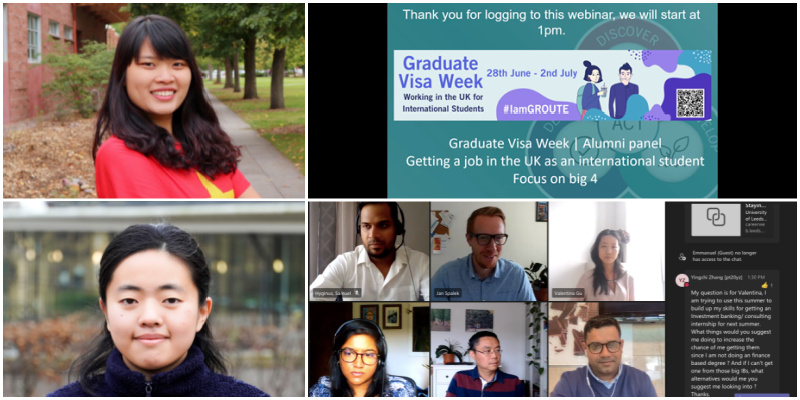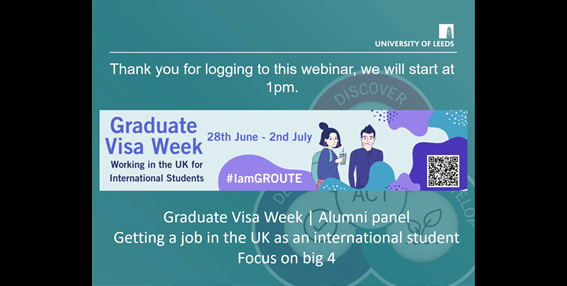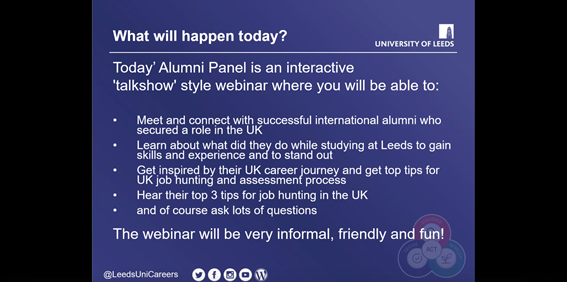Getting a job in the UK as an international student

Hi everyone, we are Sara & Khanh. As part of the Graduate Visa Week organised by the Careers Centre, we participated in one of event that took place called “Getting a job in the UK as an international student”. In this blog, we will be sharing with you some of the interesting information that we have learned through this event.
Sara – Focus on the Big Four
Most of us international students are worried about job prospects once we graduate. But, with the University of Leeds boasting over 281,000 alumni from more than 190 countries, we have the chance of hearing from some of them on how they navigated the challenging UK job market.

Six international alumni took time out of their busy schedules to share their experience getting into the UK job market.
- The Alumni
The six fantastic alumni are from different backgrounds and pursued different professions, but they are all now successful full-time workers in the UK. Not all had extensive experience working before their studies, and they gained work experience through volunteering, joining clubs and societies, working part-time jobs and doing internships or work placement.

2. Things to do as a student.
Be proactive. All of the alumni joined a club or society and took positions of responsibility. They also often talked with employers, and did not hesitate in getting help.
Get help from the Careers Centre. Many of the alumni took their CVs to the Career Centre for advice. They also practiced mock interviews with them. The Careers Centre also holds many events throughout the year. One alumnus made important networks through attending as many of these events as they can.
3. Challenges and how to overcome them.
Rejection. We all want to talk about our successes. Few talk about the countless rejections that they faced before they got that one job. Some of these rejections were upsetting. However, rejection can become a confidence booster. Learn from rejection. Ask the employer why you were rejected for the role via email and phone, this is key to future success.
Rejection is part of job hunting. Try getting support and advice from friends and family. You can always turn a story of rejection into a story of resilience.
Language barriers. English is often not our first language and this can often feel like a barrier. However, being able to speak other languages means you have better understanding than most about the challenge of trying to communicate in a different language.
Strengths and weaknesses. Identifying your weaknesses early means you have time to improve. For example, if giving a presentation is something that terrifies you, work on it! There are lots of online courses available for all of us, and we should all make the effort to upskill.
4. How to use LinkedIn
LinkedIn is the platform most of the alumni were using. Find opportunities there and apply directly on the company/institution website. Directly contacting hiring managers, asking them about the role and working on your CV based on their answers was also one of the key recommendations from the alumni. LinkedIn is also a great way for you to understand the job role better. Ask people working in the department or role you are interested in, it can help you better understand the role you are applying for.
5. Lastly, recommendation to international students
What all the alumni said was to keep trying. Opportunities are boundless. New businesses are opening all the time in London, so keep on trying. Apply to jobs that you want, apply to ones that will be nice if you get it, and apply to many more as practice. Do not be disheartened by rejection and remain positive!
Khanh – Focus on small and medium-sized enterprises (SMEs)
As a master student from MSc Sustainability and Consultancy, I have always wanted to search for a suitable job/position in a UK company. When I first knew about the webinar called “Alumni panel 2- Getting a job in the UK as an international student- Focus on small and medium-sized enterprises (SMEs)", I knew instantly that this is the event for me.
Overall, the event is a friendly sharing session with 6 international alumni from University of Leeds to learn about their experience in building knowledge, skills for professional development and some of their tips for job hunting in the UK. The guest panels have different backgrounds of studying, job experience and they were friendly and open in sharing their experience and giving us helpful advice.

Some useful tips and advice that I gain from the event:
- Be proactive in networking, building skills and also looking for job opportunities.
- Networking:
- Keep a close connection with your guest lectures. Connect with them on LinkedIn and ask them for advice in career development and job opportunities.
- Take part in the clubs, societies organised by the University of Leeds and Leeds University Union (LUU) to build your network with other students, friends. This will be very useful for you not only in broadening your network, but also in improving your communication skills.
- Utilise services provided by the Career Center of University of Leeds:
The career center of University of Leeds is a very useful resources where students can:
- Find jobs.
- Get the advice to build a strong CV through the Vmock tool.
- Gain experience and feedback from the career center by attending a mock interview.
- Build a strong profile on your Linkedin.
- Prepare everything as early as possible:
- Start to look for jobs as soon as possible before your graduation time.
- Expand your nets and your search while searching for jobs. Don’t just look for job opportunities in large, well-known companies, consider other types of companies
- Find a company that is willing to sponsor your working visa. Discuss this issue with your recruiter from the beginning because this is very important, it will guarantee your staying and working permission in the UK.
- Get your CVs, cover letter, different kinds of paper well-prepared before you start to apply for jobs.
- Know your unique selling points- Differentiate yourself from other candidates:
- Don’t have just 1 CV. Tailor your CV to suit different sectors/ companies.
- Understand the context of the company and the sector by reading/ researching the news about your company and your sectors/ profession.
- Learn from online courses from LinkedIn, Coursera outside of your academic courses from the university.
For more information, visit the Careers Centre webpage.
